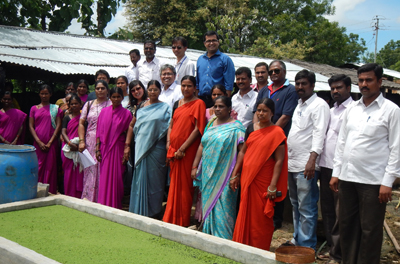Empowering the Poor in Indonesia

Key Contact
Sonya Woo
Start Date
End Date
Funding Amount
$ 49,706
Knowledge-receiving Countries
Summary
With assistance of the Bank and other donors, Indonesia has supported a National Program for Community Empowerment (PNPM), which has helped more than 70,000 villages prioritize needs and access community grants for development projects. The PNPM has been highly successful in supporting community infrastructure projects, such as building roads and water facilities, but has made limited progress applying community-driven development (CDD) approaches to enhance the livelihoods of the poor and women. To help improve this record, the Bank supported a study tour of Indonesian officials to Nepal and three states in India. The officials learned how four CDD projects organized poor households and women into Self-Help Groups (SHGs) and village-wide federations to promote economic development and social inclusion.
In September 2013, 15 officials from Indonesian Ministries and the PNPM Support Facility, with funding from the South-South Facility, traveled to South Asia to meet with staff and officials from the Poverty Alleviation program in Nepal, the Jeevika program in Bihar State, the Pudhu Vaazhu program in Tamil Nadu, and the Indira Krathni Patham program in Andhra Pradesh. Delegates learned first-hand about ways to target or mobilize SHGs of poor households and women, encourage savings and loans within SHGs, federate such groups into community organizations with links to formal banks, and increase economic opportunities and other services to improve lives.
Delegates gained knowledge and skills to design and implement CDD approaches within the PNPM. In a post-exchange survey, delegates noted that the exchange improved their understanding of CCD as a platform for economic inclusion, and thought CCD would help the PNPM to “move forward.” The exchange also led to recommendations on how to reform the PNPM, particularly on ways to target and build SHGs, build community institutions, manage community credit programs, and improve livelihoods.
After the exchange, Indonesia’s Ministry of Development Planning (BAPPENAS) initiated a pilot program that incorporated some lessons from the exchange to support the PNPM’s livelihood goals.
Beneficiaries / Participants
Since 2007, Indonesia has supported a National Program for Community Empowerment (PNPM), helping more than 70,000 villages prioritize their needs and support development projects through community grants. Supported by the World Bank, the PNPM has successfully engaged communities to develop and implement infrastructure projects, such as building roads and health and water facilities, as well as creating income-generating activities. However, the PNPM has made less progress with applying grants and community-driven development (CDD) approaches to enhance livelihoods of the poor. PNPM’s policies have been geared toward infrastructure projects, and officials and stakeholders have lacked the commitment and skills to apply CDD approaches. In response, the Government of Indonesia developed a strategy to improve livelihoods of the poor through the PNPM’s Rural and Urban programs, including through a pilot with the Bank.
Indonesian officials requested assistance from the Bank to learn about international best practices in designing and implementing CDD programs aimed at improving livelihoods of the poor, especially poor women. The Bank organized a study tour, sending Indonesia officials to Nepal and three states in India (Bihar, Tamil Nadu, and Andhra Pradesh) that had applied CDD programs through community self-help groups to empower the poor, women, and vulnerable groups. Aims were to increase Indonesian officials’ valuation and ownership of CDD, increase their skills to apply CDD designs, and identify lessons on how to target the poor, build community organizations, set-up credit funds, and strengthen livelihoods. One goal of the exchange was to identify ways to reform Indonesia’s PNPM program, including the pilot.

 China
China Colombia
Colombia Denmark
Denmark India
India Indonesia
Indonesia Mexico
Mexico Russian Federation
Russian Federation Spain
Spain United Kingdom
United Kingdom